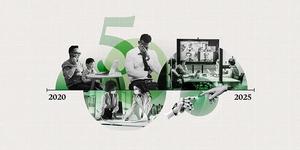Gen Z workers in the U.S. are the least likely generation to prefer exclusively remote work, according to Gallup’s latest May 2025 findings. Only 23% of remote-capable Gen Z employees say they would prefer fully remote work, compared with 35% among each older generation. Fully on-site work remains the least popular option across all age groups.
When Gallup asked hybrid workers how they want others in their organization to work — more remote, less remote or the status quo — a plurality of hybrid workers in each generation say the current balance is right. Still, Gen Z is the most likely to say they wish employees in their organization worked remotely less often. In contrast, millennials are the most likely to say they want other employees to work remotely more often.
Hybrid Millennials Have the Strongest Attachment to Remote Work
Among hybrid workers, millennials have a stronger personal attachment to remote work flexibility than other generations. When asked how likely they would be to look for another job if remote options were partly or entirely taken away at their workplace, 41% of remote-capable millennials say they would be extremely likely to look for another job, significantly higher than other generations.
Millennials also stand apart when it comes to where they believe they do their best work. About half of millennials (49%) say they are most productive at home or off-site, higher than all other age groups. Only 19% of millennials say they are most productive on-site or in the office.
In contrast, though a plurality of Gen Z workers says they do their best work remotely (37%), they are nearly as likely to say they are most productive on-site (32%) or that their location doesn’t matter (31%).
Understanding Gen Z’s Remote and Hybrid Work Preferences
Parenting plays a role in shaping views on remote work. Very few Gen Z workers are the parent or guardian of a child younger than 18. Employed Gen Z and young millennial parents (born in 1989 or later) are more likely (39%) than non-parents in this age group (29%) to prefer exclusively remote work. However, for older millennials born 1980 to 1988, there is no difference between parents and non-parents (36% for each) in preference for remote work.
Differences in parenting status may help explain why Gen Z and millennials prefer different work setups, but why is Gen Z more likely to want less remote work time for other employees?
Two factors may help explain this:
- Gen Z is the loneliest generation. Gen Z employees have the lowest life evaluations of any generation at work. They are also the most lonely. Gen Z is almost twice as likely as Gen X, and nearly three times as likely as baby boomers, to say they experienced loneliness a lot of the day yesterday.
###Embeddable###
- Hybrid Gen Z employees may not see their coworkers as often on-site. Hybrid workers among the three older generations Gallup studies are fairly mixed in their reports of on-site working requirements and flexibility. Meanwhile, the vast majority of Gen Z hybrid workers (66%) say they are required to work a certain number of days on-site each week, but they can choose which days. Gen Z is also twice as likely as other generations to say they are encouraged — but not required — to come in each week. This could mean they are showing up when coworkers are not in the office, reducing the potential for meaningful, in-person interactions.
###Embeddable###
What Leaders Can Do
Gen Z prefers hybrid work the most, but they may miss out on its in-person benefits if they show up to an empty office. One fix is to change hybrid policies so that younger employees are more likely to interact with others. An even better option is for leaders to discuss with their team how each person works best and coordinate in-person time at the team level.
Explore the Future of Work
- Track how hybrid work is shaping the future of employee wellbeing with Gallup’s Hybrid Work indicators.
- Uncover what Gen Z wants from work and life with Gallup’s latest generational insights.
- Read Gallup’s research on the remote work paradox to see how flexibility affects engagement and wellbeing.




